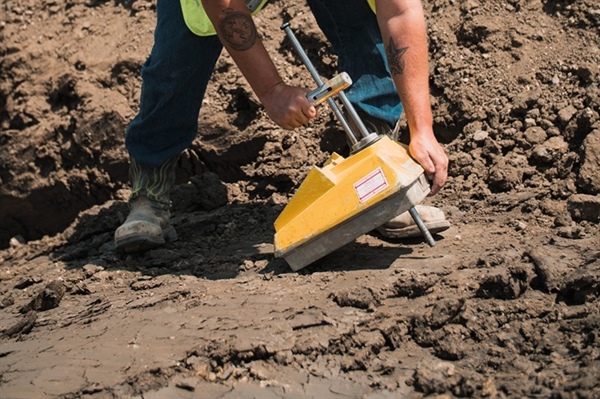How Soil Testing Ensures Stability in Building Projects

Stability is the cornerstone of any successful construction project. It's the literal foundation you build upon, but it's also the financial and logistical bedrock that keeps your project on track. When you think about stability, you might first picture a solid, unmoving structure. But for developers, investors, and builders, stability also means predictable timelines, manageable budgets, and minimal unforeseen risks.
What if one service could deliver both types of stability? Geotechnical soil testing is that service. It’s the critical first step that ensures the ground beneath your project is physically stable while also stabilizing your schedule and finances. Neglecting this phase is a gamble that can introduce profound instability, turning a promising venture into a source of constant problems.
This post will explore how professional soil testing is the key to achieving total project stability, from the ground up.
The Foundation of Literal Stability
Before a single trench is dug, the most important questions about your site lie unanswered beneath the surface. What is the soil made of? How will it behave under the immense pressure of a new structure? Soil testing provides the answers, ensuring the physical stability of your project.
Understanding Soil Composition & Behavior
Soil is not a uniform material. It varies dramatically from one location to another, and even across a single building site. It can be a mix of sand, silt, clay, rock, and organic matter, each with unique properties.
A variety of soil tests can be used to determine a structure's needs in relation to the soil, including:
-
Load-Bearing Capacity: This is the soil's ability to support weight. A soil test determines if the ground can handle the load of your planned structure without shifting or sinking. Building on soil with poor load-bearing capacity without proper engineering can lead to catastrophic foundation failure.
-
Soil Plasticity and Moisture Content: Certain soils, such as expansive clays, expand when they absorb water and contract as they dry. This constant movement can crack foundations, warp structures, and create ongoing maintenance nightmares. Soil testing identifies these volatile soils early, allowing engineers to design foundations that can mitigate these effects.
-
Groundwater Levels: The presence of a high water table can significantly impact construction. It can impact excavation, foundation design, and the long-term integrity of below-grade structures, such as basements and parking garages. Knowing the groundwater level is crucial for planning a stable and dry building.
By analyzing these characteristics and more, geotechnical engineers can provide a detailed report that forms the blueprint for a stable foundation. This isn't just about avoiding disaster; it's about building with confidence, knowing your structure is on solid ground.
Securing Figurative Stability for Your Project
While physical stability is paramount, the stability of your project's finances and timeline is just as critical for success. Soil testing is a powerful risk management tool that brings predictability to the construction process, protecting your investment from the start.
Stabilizing Your Budget
Unexpected soil issues are one of the most common causes of budget overruns. Imagine discovering halfway through excavation that the soil is unsuitable and requires extensive, expensive remediation. Suddenly, your carefully planned budget is obsolete.
By investing in soil testing upfront, you replace guesswork with data.
-
Preventing Costly Surprises: A geotechnical report identifies potential problems before they become expensive emergencies. Whether it's the need for deep foundations, soil replacement, or sophisticated drainage systems, you can account for these costs in your initial budget instead of reacting to them mid-project.
-
Optimizing Foundation Design: Oversights can be expensive, but so can over-engineering. Without accurate soil data, engineers may be forced to design an overly cautious and unnecessarily expensive foundation "just in case." Soil testing provides the precise information needed to design a foundation that is both safe and cost-effective.
-
Securing Financing: Lenders and investors want to see that you have done your due diligence. Presenting a comprehensive geotechnical report demonstrates a proactive approach to risk management, making your project a more attractive and stable investment.
Stabilizing Your Timeline
In construction, time is money. Delays can have a domino effect, pushing back schedules for every subsequent trade, increasing labor costs, and potentially incurring financial penalties. Unforeseen ground conditions are a primary driver of such delays.
-
Eliminating Excavation Delays: Soil testing can reveal the presence of large rocks, a high water table, or contaminated soil that could halt excavation work. Knowing about these obstacles in advance allows you to build the necessary time and resources into your project schedule for dealing with them.
-
Streamlining the Permitting Process: Many municipalities require a geotechnical report as part of the building permit application. Having this report ready from the outset prevents delays in the approval process, allowing your project to get started on time.
-
Avoiding Rework: Identifying a soil issue after construction has begun can result in devastating stop-work orders and necessitate costly rework. A proper soil analysis ensures you get the foundation design right the first time, keeping the project moving forward smoothly and on schedule.
Build on a Foundation of Certainty With Terradyne
Stability isn't something you can afford to leave to chance. It must be engineered from the very beginning. Comprehensive soil testing provides the data-driven certainty you need to ensure your project is stable in every sense: physically, financially, and logistically. It transforms unknown risks into manageable variables, laying the groundwork for a successful and profitable outcome.
Don't let the ground beneath your feet become the biggest variable in your project. The team at Terradyne provides expert geotechnical engineering and soil sampling services, along with environmental engineering, to give you a clear picture of your site's subsurface conditions. We help you build with confidence, knowing your project is founded on stability.
Contact Terradyne today to schedule a consultation and ensure your next project gets off to a solid start.